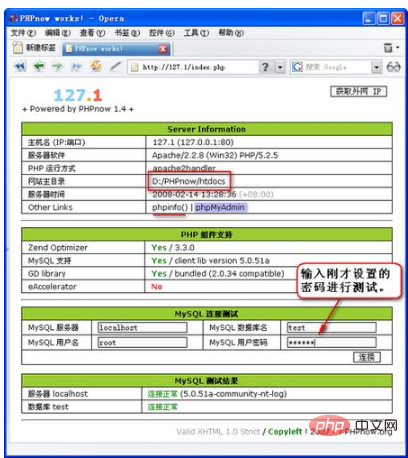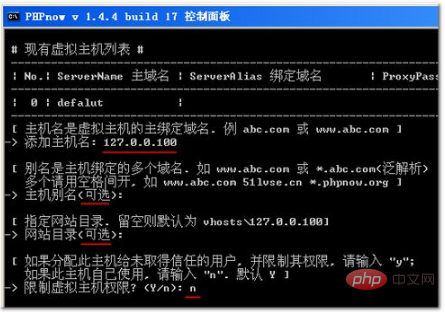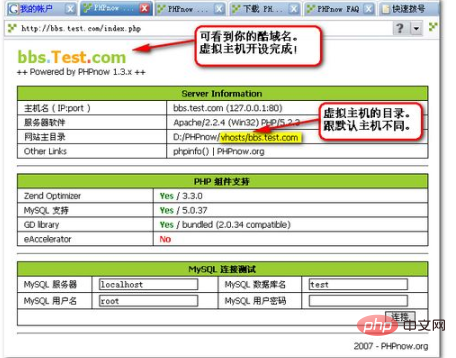
How to install phpnow?
First download the latest version of PHPnow from http://www.phpnow.org/download.html. PHPnow has two packages, one is the exe self-extracting version (recommended, this article is for this version), and the other is the pure 7z file (without exe self-extracting).
Execute PHPnow-1.4.x.exe and the following figure will appear. Just press Enter.
Recommended: "PHP Tutorial"
Figure-1: Decompression dialog box

After automatic decompression is completed Afterwards, Init.cmd will be automatically executed for initialization. As shown in Figure-2: A firewall prompt may appear during
, please allow it.
Figure-2: Init.cmd process


##Init.cmd can be completed in ten seconds. Once all is completed, the default page will open automatically.
(If not, try to open http://127.0.0.1 manually)

Figure-4: Successfully built
If You just want to build a website, and the above environment is enough. Very often we need to open multiple independent websites. For example, separate forums and homepages, share servers with friends, etc. At this time, virtual host will be used.
Let’s talk about the use of PHPnow virtual host. Very simple.
Double-click to execute D:\PHPnow\PnCp.cmd (maybe your installation path is not D:\PHPnow), enter 2 and press Enter.
Enter the new virtual host information as prompted. As shown in Figure-5.
Figure-5: Open a virtual host

After entering the information and pressing Enter, Apache will be automatically restarted to take effect.
Then access the domain name you just added, making sure to resolve the domain name and point it to your server IP in advance.
If you don’t have a domain name or don’t know how to use it, you can use the “virtual domain name” by editing C:\WINDOWS\system32\drivers\etc\hosts.
The bbs.test.com in this example is implemented by adding a line "127.0.0.1 bbs.test.com" to the next line of "127.0.0.1 localhost".
Figure-6: The virtual host is successfully opened
You may also need to allocate a MySQL database for each virtual host. Here is how to use phpmyadmin to allocate users and databases.
Open http://127.1/phpMyAdmin; log in as root.
Then click "Permissions" and then "Add New User".
Fill in the new user name and password;
Select the second item "Create database with same name and grant all privileges".
Keep the rest as default; it should be mentioned that global permissions do not need to be selected unless necessary. Otherwise, do not select them at all.
Click [Execute] to complete. If you don’t understand, just look at the picture.

Figure-7: Add database user.
Just hand over the username and password you just added to the user. Note that root has the highest authority, do not give your password to others easily.
alright! You now have a professional PHP server environment. What Discuz! 6.0, PHPWind, DeDe, PHPCms is no problem, start your website building journey right away.

The above is the detailed content of How to install phpnow. For more information, please follow other related articles on the PHP Chinese website!







